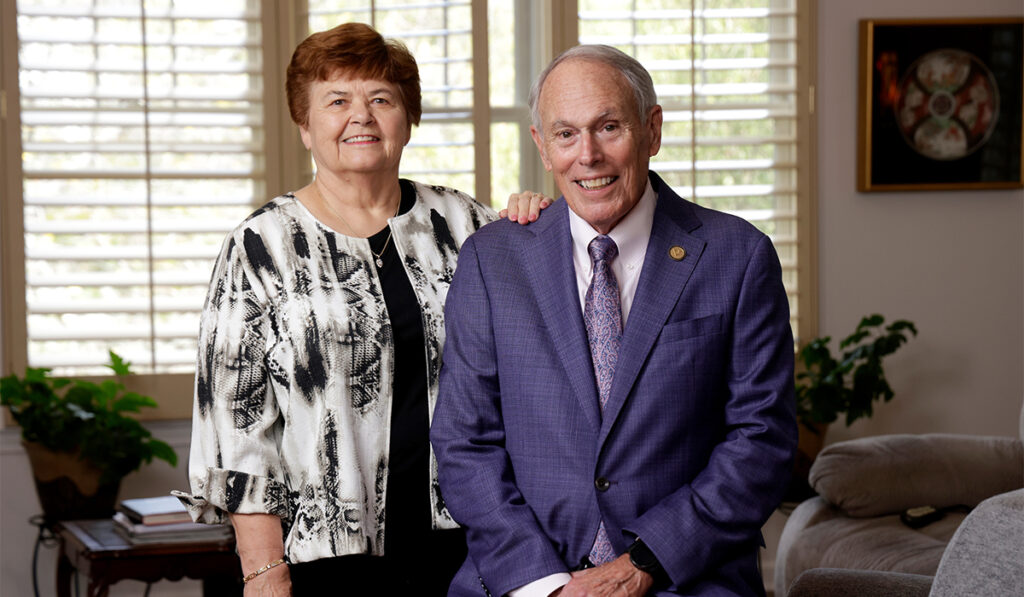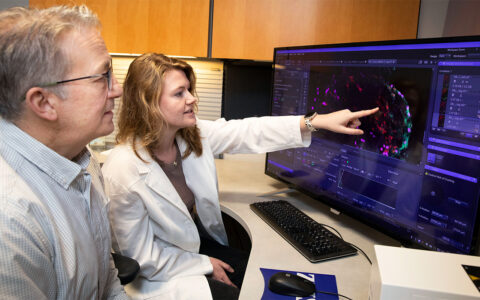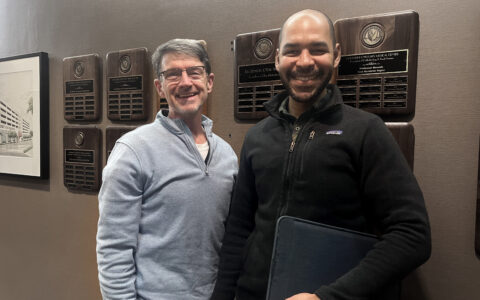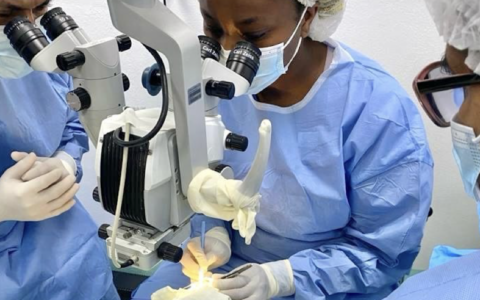Featured in the Vanderbilt Eye Institute Impact Report 2024. Peruse the rest of the Impact Report here.
The Vanderbilt Eye Institute’s (VEI) triple mission is to provide excellence in personalized eye care, to educate and inspire the next generation of clinicians and researchers, and to innovate with new treatments that preserve and restore vision.
A series of generous gifts from the Honorable Judge Leslie Smith and his wife, Judy, is advancing all three.
The Smiths have long had an interest in eye health, especially age-related eye disease. Both their fathers had macular degeneration, so they have experienced the devastation of blinding eye disease firsthand.
Les describes his father, Leslie M. Smith, M.D., as a colorful character who joined the circus at 13 to escape abject poverty and learned to play trumpet in the circus band. Attending the University of Kentucky in the 1920s, Dr. Smith helped write the music for the university fight song still used today. He played in dance bands to work his way through Vanderbilt University School of Medicine and went on to establish a successful ophthalmology practice.
“My father overcame great odds to become an ophthalmologist, only to go totally blind in his later years,” Les said. “One of our greatest interests is supporting scientific discovery that will lead the way to a cure for macular degeneration and other blinding eye diseases.”
“My father overcame great odds to become an ophthalmologist, only to go totally blind in his later years. One of our greatest interests is supporting the scientific discovery that will help find a cure for blinding eye diseases.”
After Les earned his undergraduate degree from Vanderbilt University, he spent five years flying Air Force missions in Vietnam, then returned to attend the UK School of Law. He and Judy married and ultimately settled in New Mexico, where one of their first philanthropic ventures was purchasing eyeglasses for students at the New Mexico School for the Blind.
“Judy’s sister-in-law worked at the school and told us there was no budget to buy these kids the thing that was so essential for them to thrive,” Les said. “Since then, our giving philosophy has been: If you see a need and can help, do it!”
Planning for the Future
As a member of the VEI Advisory Board since 2008, Les understands the importance of planned giving to the sustainability of the institute. For this reason, Les and Judy have planned to endow two funds through their estate: the Leslie M. and Evelyn C. Smith Chair in Ophthalmology in honor of Les’s parents, as well as a physician training fund.
These gifts will impact the clinical, training and research missions of VEI for many years to come.
Additionally, the Smiths – in partnership with other Advisory Board members – established the Leslie and Judy Smith Discovery Fund in Ophthalmology in 2017, which supports innovative research ideas initiated by VEI faculty. The fund awards small seed grants for researchers to conduct preliminary studies to support applications for National Institutes of Health and other funding.
“These are scientists who need $10,000 to $20,000 to jumpstart basic research projects,” Les said. “You can’t just walk in and apply to the NIH without data to support your hypothesis. Every board member sees the value in this effort and contributes annually to the Discovery Fund.”
“These are scientists who need $10,000 to $20,000 to jumpstart basic research projects. You can’t just walk in and apply to the NIH without data to support your hypothesis.”
The Discovery Fund program has since awarded just over $1 million for pilot projects, with multiple projects attracting substantial subsequent NIH funding, said David Calkins, Ph.D., Denis O’Day Professor and Vice Chair for Strategy in Ophthalmology and Visual Sciences. VEI is now one of the top 10 programs annually receiving financial support from the NIH.
“Innovation takes time and resources,” Calkins said. “The commitment of our board members to consistently provide pilot funding is the spark that starts the engine of discovery. Their generosity begins the process of advancing new treatments for blinding eye disease.”
Training Pediatric Ophthalmologists
A shortage in pediatric ophthalmologists and wide gaps in access to pediatric eye care across the country are critical public health concerns.
Since their initial work in New Mexico, the Smiths have always supported eye care for children. A key priority for them is to provide training for the next generation of pediatric ophthalmologists. Toward that end, the couple created the Judy and Leslie Smith Fellowship in Pediatric Ophthalmology to support pediatric ophthalmology fellows as they pursue careers in this underrepresented specialty.
“When I interviewed for pediatric ophthalmology fellowships in 2014, I sought out programs with high volume, the most complex patients, and faculty who could be lifelong mentors,” said Anvesh Reddy, M.D., assistant professor of ophthalmology and visual sciences and a former VEI fellow.
“To take care of children with rare and blinding problems, you have to constantly adapt and grow your skill set. My training at VEI gave me this framework and taught me how to be a clinician educator.”
Currently, Reddy serves VEI as director of the institute’s Pediatric Ophthalmology Fellowship program.
“Without the efforts of my fellowship mentors and the generosity of Les and Judy Smith, I would not be where I am today,” he said.
A Lasting Impact
Les and Judy, now retired, recently moved to Brentwood, Tenn., to be closer to their grandchildren. Although they have traveled the world many times, the couple is happy to be able to conveniently attend Vanderbilt events.
The Smiths also plan to host an eye education presentation in their new community, with VEI faculty as presenters.
“We’ve made lifelong friends on the Vanderbilt Eye Institute board and among the faculty, and we intend to stay involved as long as we can,” Les said.
Their leadership, advocacy and generosity will be felt at VEI for many years to come.
“We’ve been fortunate to have found a place where we could make a difference in so many ways.”



